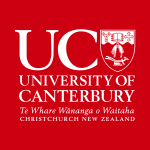Computer Science & IT courses
University of Canterbury

- New Zealand
- World Rank : 301
- Visit Website
When people think of Computer Science they often just think of programming, but there are many more aspects to the field, including interaction design, communications and networks, software design, computer security, information systems, big data, machine learning, graphics, operating systems, educational systems, artificial intelligence, and embedded systems (processors that are embedded in everything from mobile phones to cars). All of these areas are experiencing rapid growth both in Aotearoa New Zealand and internationally, and there is a strong demand for Computer Science graduates.
Computer Science is about helping people do their work efficiently and effectively by analysing needs and constructing appropriate solutions. It goes way beyond programming, as it is about knowing how to design systems that are fast, usable, reliable, secure, scalable, and make a positive impact on society and our environment.
Computer Science students learn techniques to tackle these challenges for applications as diverse as monitoring the condition of patients in hospitals to designing educational games for smart phones.
Why study Computer Science at UC?
Career opportunities
There is a strong demand for graduates who are qualified in Computer Science, particularly those who combine technical skills with good communication skills and teamwork ability. Waitaha Canterbury's leading-edge IT sector is facing a shortage of qualified graduates, meaning that UC-qualified Computer Science graduates are in high demand.
Many employment opportunities exist with organisations that run large computer-based systems, such as finance companies, airline industries, government departments, state-owned enterprises, consulting companies, and computer organisations themselves. Work with these organisations often involves international travel opportunities. Many of our students start up their own software companies, and end up being employers rather than employees.
Apart from a professional career in computing, a degree in Computer Science can be used as a good basis for a career in the many areas in which computer systems are applied. Graduates are employed in fields including education, computer forensics, embedded systems and computer graphics, and in a variety of positions including software engineer, programmer, analyst, computer consultant, webmaster, internet developer, GIS analyst, games developer, and computing tutor.
Class 12th: 75%
Approved English tests
UC recognises the following English Language tests and courses:
APPROVED ENGLISH TESTS
| University Type | Public University |
| Campus Setting | Urban |
| Establishment Year | 1873 |
| No. of Campuses | 1 main campus |
| No. of Residence Halls | 10 |
| Graduate Job Rate | 89.9% (full time) |
| Research Funding | Above 600,000 NZD pa |
| Cost of Attendance | 29,550 NZD pa |
| Applications Accepted | Online |
| Work-Study | Available |
| Intake Type | Semester wise |
| Mode of Program | Full time and online |
| Courses | UG | PG | Doctorate |
|---|---|---|---|
| Arts | 25,500-30,200 | 29,000-33,800 | 6,749 |
| Business | 28,100 | 29,900 | 7,066 |
| Engineering | 42,000 | 42,000 | 8,130 |
| Science | 32,000 | 34,900-36,600 | 7,062–7,855 |
| Law | 30,200 | 33,800 | 7,066 |
You'll require between $20,000 and $25,000 a year ($380–480 per week) for housing/rent, food, transportation, phone bills, internet usage, and entertainment, in addition to your tuition and insurance fees. The average living expense will be the same for everyone, regardless of their tuition or course price. Please keep in mind that these are only suggestions; the Immigration New Zealand requirement is $15,000 per year including return travel or an additional $2,000.
| General expenses | Cost (in NZ dollars) |
| Rent (per month) | $800–$950 |
| Groceries (per week) | $100–$150 |
| Gym membership (per year) | $300 |
| Entertainment (per week) | $50 |
| Milk (per litre) | $3 |
| Coca Cola (per can) | $2 |
| Cup of Coffee | $3–$5 |
| Lunch from University food hall or campus café | $7–$12 |
| Local calls made from a cell-phone | $0.50–$1.50 |
| Taxi - 5 km ride | $10–$12 |
| Movie ticket | $10–$14 |
| Visit to doctor | $45–$85 |
| Tuition Fees in New Zealand (1st Year Average) | BE/Btech NZD 24605 | MBA NZD 25694| MS NZD 29178 | BSc NZD 30702 | BBA NZD 22863 | MEng NZD 41589 | MIM NZD 34186 | MFin NZD 142025 |
| Average Accomodation & Food Costs in New Zealand | NZD 1250 Per Month |
| Entrance Exams in New Zealand | TOEFL: 74 | IELTS: 6 |PTE: 53 |
| Work and Study in New Zealand | Permitted for 20 hours/week with a valid study permit. |
| Post Study Work Permit in New Zealand | One to Three Years Depending on the Region. |
| Cost of Student Visa in New Zealand | NZD 295 |
| Student Visa in New Zealand | If a student wants to study full time in New Zealand for more than three months, and is willing to pay the full cost of the course, Fee-Paying Student Visa is for him/her. |
| Intakes in New Zealand | There are Two Main Intakes in New Zealand: January Intake and July Intake. |
| Top Job Sectors in New Zealand | Engineering, Software Developing/Programming, Medicine, Education, Accounts, Electrician, Automotive Technician, etc. |
| Economy in New Zealand | Growth Rate of 2.8% (2018), 2.5% (2019e), 2.7% (2020e), 22nd Largest in the World by Nominal |
Tuition & fees :
$ 32,000
Hostel & Meals :
$ 13,040
Total
$ 45,040